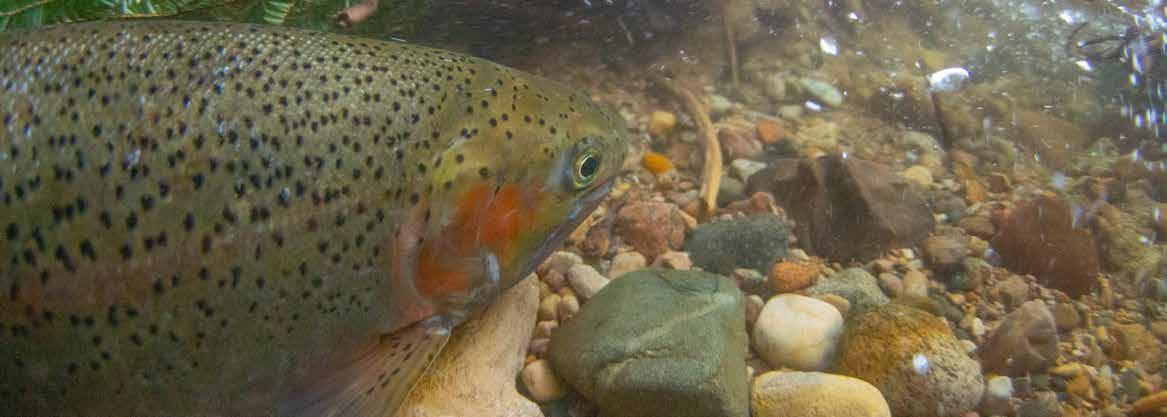Michigan Trout Unlimited
MICHIGAN Trout
Trout Unlimited National’s Work in the Great Lakes
8
by Nichol DeMol, Great Lakes Habitat Program Manager
Spring 2021
Trout Unlimited continues to increase its efforts in the Great Lakes region. The past year saw a wide range of success for TU’s Great Lakes Program across the “Protect, Reconnect, Restore and Sustain” components of our mission. The region’s staff continues to grow to meet the growing demands, with a total of nine full-time staffers now. The Great Lakes staff includes biologists, engineers, and policy experts who provide project management, grant management, engineering design, training, youth education, and monitoring to carry out TU’s conservation mission. Below are highlights of our work across the Great Lakes, as well as a short introduction to the staffers working on these projects. If you have any questions about TU’s work in the Great Lakes region, please reach out to the field team members noted below or the Great Lakes Habitat Program Manager, Nichol DeMol, at nichol.demol@tu.org. You can keep up with the team’s many efforts by following TU’s Great Lakes Program on Facebook (@GreatLakesTU) and Instagram (@troutunlimitedgreatlakes). Rogue River Located near the second largest metropolitan area in Michigan, the Rogue River is an extremely important trout fishery in southwestern Michigan. However, the watershed is experiencing pressures from growth and development, resulting in rising summer water temperatures and excessive sediment input. Because of this threat, TU designated the Rogue River as a Home River in 2010. Jamie Vaughan has been working with TU as the Project Manager for the Rogue River Home Rivers Initiative since 2014. One of the latest restoration projects she led was the planting of over 17,000 trees within the watershed. Along with restoration activities, Jamie has been creating opportunities to inspire the next generation of conservation-minded anglers through outreach and education efforts. In 2021, TU’s STREAM (Science, Technology, Recreation, Engineering, Arts, Mathematics) Girls program, a watershed STEM (Science, Technology, Engineering, Mathematics) program for girls, will be expanded into new watersheds throughout the state. To foster the next generation of women scientists, TU, through the STREAM Girls program, aims to bridge the gender gap in STEM fields by engaging girls in hands-on science and fly fishing. Jamie has also been assisting with West Michigan’s
first Mayfly Project, which uses fly fishing as a catalyst to mentor and support children in foster care. This summer, the team is rebuilding efforts to engage foster students this and looking for volunteers to bring this amazing program to fruition. This is a great opportunity to use your skills as an angler and support children in foster care through fly fishing to have fun, build confidence, and develop a meaningful connection with the outdoors. To learn more about TU’s Rogue River Home Rivers Initiative and youth education efforts, please reach out to Jamie Vaughan at jamie.vaughan@tu.org. Great Lakes Science TU’s citizen science opportunities in the Great Lakes have grown with the relocation of TU’s Eastern Angler Science Coordinator, Jake Lemon. Jake transferred from Pennsylvania to Michigan in 2018 and leads the citizen science programs, which include spawning redd counts, water temperature and flow monitoring, watershed assessments using TU’s RIVERS app, and eDNA sampling. This past year TU supported our chapters and partners in enhancing their water monitoring activities with the Mayfly Sensor Station, a real-time stream monitoring technology. Developed by Stroud Water Research Center, the Mayfly Sensor Station is a low-cost, an easy-to-use water monitoring station designed to collect continuous data. Data are then uploaded to an online database via cellular signal for real-time access to current stream conditions (https://monitormywatershed.org/). This year, TU will be launching a new project involving mapping stream temperature in fine-scale using thermal cameras mounted on unmanned aerial vehicles, also known as drones. This fine-scale mapping will enable us to find seeps, springs, and tributaries providing thermal refugia to coldwater species, enhancing our ability to prioritize site projects. If you would like to know more about TU’s community science efforts in the Great Lakes region, contact Jake Lemon at jacob.lemon@tu.org. Northern Wisconsin TU staff is working in Wisconsin to reconnect and protect native trout habitat in Lake Michigan and Lake Superior tributaries. Chris Collier, Project Manager in Wisconsin, has continued efforts that have resulted in a total of 115 miles reconnected since 2016. Highlighting











